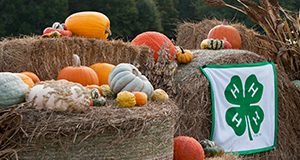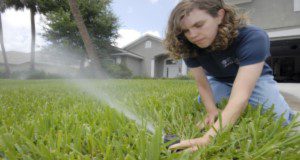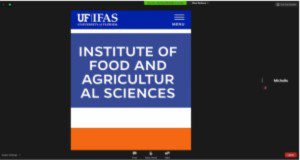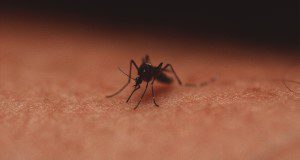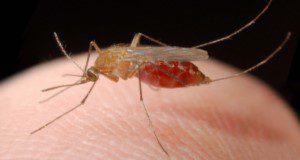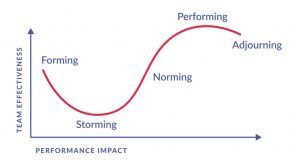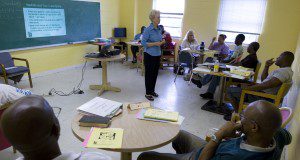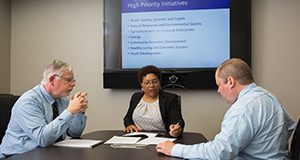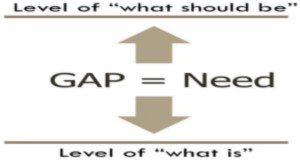This 8-page document introduces the core requirements and organizational considerations for replicating a cooperative animal unit. Written by Alyssa Schortinghouse, and published by the UF/IFAS 4-H Youth Development Department, August 2020.
https://edis.ifas.ufl.edu/4h409
Category: Program Development
Best Practices for Communicating about Outdoor Residential Water Conservation
Extension communication efforts can be made more effective when following a strategic communication plan. To guide a strategic communication effort, it is imperative to have purposeful messaging along with an understanding of your target audience and communication channel. This new 3-page document, published by the UF/IFAS Department of Agricultural Education and Communication, presents a synthesis of literature highlighting best communication practices in regard to water conservation efforts. Written by Jacqueline Aenlle and Laura A. Sanagorski Warner.
https://edis.ifas.ufl.edu/wc366
Understanding Extension #2: Utilizing Extension Services in School-Based Agricultural Education
The services that Extension offers can supplement lesson plans in the classroom, can help to provide training and support for educators, and can help to build the toolbox of both first-year educators and the veteran educators that want to expand on their current lesson plans and resources. This new 4-page publication of the UF/IFAS Department of Agricultural Education and Communication helps to describe how UF/IFAS Extension can be utilized in agricultural education. Written by Debra Barry, John Diaz, Alyssa Shepherd, Jennifer Patton, and Stephen Gran.
https://edis.ifas.ufl.edu/wc367
Delivering Secure CEU Training Utilizing Zoom
Delivering online, live CEU (Continuing Education Unit) training has become increasingly practical with the development of programs like Zoom. However, there are key differences between the two platforms that Zoom offers, Zoom Meeting and Zoom Webinar. Understanding the pros and cons of each platform and how to utilize each to deliver CEU content is key. Through descriptions and screenshots of the program, this new 7-page publication of the UF/IFAS Pesticide Information Office helps readers navigate the platforms and better understand which one best fits their needs. Written by Brett W. Bultemeier and Michelle Atkinson.
https://edis.ifas.ufl.edu/pi286
Strategies to Increase Personal Resilience in Disaster Response Efforts
This 3-page publication highlights strategies to help Extension professionals increase their personal resilience in disaster response efforts. Written by Amanda D. Ali, Angela Lindsey, Amy Harder, Lisa Lundy, and T. Grady Roberts, and published by the UF/IFAS Department of Agricultural Education and Communication, May 2020.
https://edis.ifas.ufl.edu/wc360
Conducting the Needs Assessment #10: The Delphi Technique
Previous publications in the Conducting the Needs Assessment series outlined why, how, and when Extension educators and other service providers should use needs assessments in their programs. The four preceding publications in the series provide Extension educators and other service providers with specific techniques that can be used in needs assessments, and this new 5-page publication provides an overview of using the Delphi technique to conduct a needs assessment. Written by Laura Warner and Amy Harder, and published by the UF/IFAS Department of Agricultural Education and Communication.
https://edis.ifas.ufl.edu/wc364
Understanding Public Perceptions of Mosquito-Related Information Sources and Adapting Research Findings to the Needs of Industry Professionals
The Prevent & Protect publication series focuses on the creation of different material formats to resonate with various audiences and ways to maximize their efficacy in communicating risk to the public about mosquito control. The overview of the Prevent & Protect project, developed by the UF/IFAS Center for Public Issues Education in Agriculture and Natural Resources (PIE Center), can be found in EDIS publication AEC694/WC357, Public Perceptions of Mosquitoes and Mosquito Control. This new 3-page document describes the importance of understanding and adapting to public perceptions of information sources and how scientists can adapt their research findings based upon the needs of professionals in the field to create usable outreach materials. Written by Shelli Rampold, Ricky Telg, Alena Poulin, Sandra Anderson, Angela B. Lindsey, Ashley McLeod-Morin, and Phillip Stokes, and published by the UF/IFAS Department of Agricultural Education and Communication.
https://edis.ifas.ufl.edu/wc358
Public Perceptions of Mosquitoes and Mosquito Control
The Prevent & Protect publication series focuses on the creation of different material formats to resonate with various audiences and ways to maximize efficacy in communicating about mosquito-related risks and mosquito control topics to the public. This new 3-page publication of the UF/IFAS Department of Agricultural Education and Communication provides a background of public opinion on various aspects of mosquito control covered in the Prevent & Protect campaign. Written by Shelli Rampold, Ricky Telg, Alena Poulin, Sandra Anderson, Angela B. Lindsey, Ashley McLeod-Morin, and Phillip Stokes.
https://edis.ifas.ufl.edu/wc357
Icebreakers for Adults
Building rapport is key when creating a team culture. As groups change over time, it is imperative to continually reintroduce and reacclimate new team members to long-standing teammates. Leaders of groups that undergo constant change, like those whose jobs involve volunteers, may find it challenging to find innovative ways to bring people together. Icebreakers are quick, low- or no-cost activities that allow individuals to get to know the people around them and serve as a means to build trust and openness in a low-stakes environment. This new 3-page publication of the UF/IFAS Department of Agricultural Education and Communication outlines strategies to use when building a team culture and gives examples of simple activities to build cultures within teams or groups. Written by Megan Stein and Taylor Nash.
https://edis.ifas.ufl.edu/wc356
Exemplary Youth Leadership Series: Challenge the Process
This publication series is designed to outline strategies and experiences to expose youth to and engage them with leadership concepts. In this new 3-page publication of the UF/IFAS Department of Agricultural Education and Communication, students will try on aspects of the third practice of exemplary leaders: challenging the process. Two quick, low-cost activities are included for implementation with youth and adults working with youth. These activities are best suited for students ages 10–18. However, modifications are included for each of the activities to allow for different group sizes, ages, and abilities of the youth involved. Written by Megan Stein.
https://edis.ifas.ufl.edu/wc353
Conducting the Needs Assessment #11: Causal Analysis Techniques
This new 3-page publication in the Conducting the Needs Assessment series provides Extension educators and other service providers with an introduction to two techniques that can easily be used when seeking information about relationships between causes and needs: fishboning and cause and consequence analysis. Written by Amy Harder and published by the UF/IFAS Department of Agricultural Education and Communication.
https://edis.ifas.ufl.edu/wc352
Floridians' Engagement in Landscape Best Practices to Protect Water Resources: Information from a 2018 Survey
Extension programs are most effective when informed by a deep understanding of the target audience. To guide programs in Florida’s managed landscapes, especially pertaining to water quality and conservation, faculty from the UF/IFAS Center for Landscape Conservation and Ecology conduct an annual statewide survey. The survey gathers data that includes common landscape elements, neighborhood characteristics, engagement in irrigation and fertilizer best practices, and learning preferences. This new 5-page publication of the UF/IFAS Department of Agricultural Education and Communication presents highlights from the 2018 statewide survey with recommendations for how to use the information. Written by Laura A. Warner, Esen Momol, Claire Lewis, Tom Wichman, Wendy Wilber, and A. J. Reisinger.
https://edis.ifas.ufl.edu/wc345
Applying Culturally Relevant Teaching to Workshops: The Checklist
As the diversity of Extension clientele continues to grow, Extension educators must consider new ways of supporting this population. In this new 2-page article, a follow-up to EDIS article AEC678, Culturally Responsive Teaching: A Framework for Educating Diverse Audience, the authors provide a checklist to serve as a guiding tool when planning workshops and to ensure that participants feel connected to, engaged with, and understood while working toward achieving workshop educational goals. Written by Cecilia E. Suarez, John M. Diaz, and Laura E. Valencia, and published by the UF/IFAS Department of Agricultural Education and Communication.
https://edis.ifas.ufl.edu/wc351
Bringing Home the Bacon: Infusing Evaluation Best Practices into Grant Proposals
Proposals possessing sound and well-funded evaluation plans are normally stronger and have greater chances of being funded. This new 4-page publication of the UF/IFAS Department of Agricultural Education and Communication shares information the authors learned during a series of meetings with federal agency program officers and evaluators about best practices for grant proposals. The practices encompass two broad categories: incorporating evaluation expertise into the project team and building a sound project rationale and evaluation plan. By adopting these practices, you will enhance the quality of your proposals; you will most likely increase the amount of extramural funding that is secured; and you will elevate the visibility and impact of programs within your organization. Written by Glenn Israel, Jaclyn D. Kropp, David C. Diehl, Conner Mullally, and Sebastian Galindo.
https://edis.ifas.ufl.edu/wc350
Conducting the Needs Assessment #2: Using Needs Assessments in Extension Programming
This second publication in the Conducting the Needs Assessment series provides Extension educators and other service providers with a foundational underpinning of how the needs assessment fits within the program planning process. Both formal and nonformal educators seeking to develop and deliver an educational program must first be informed of what their audience lacks in order to develop the right curriculum or training, and therefore conducting a needs assessment is a priority in the program development process. This new publication of the UF/IFAS Department of Agricultural Education and Communication was written by Matthew Benge and Laura Warner.
https://edis.ifas.ufl.edu/wc347
Making Action Easier: Behavioral Economics and Nudges for Extension Professionals
As Extension turns more to effecting behavior change beyond simply raising awareness or understanding concerns, how do we not only help clientele make a change, but make it easier? Behavioral economics principles can improve the way we present options to clients, increasing the likelihood of them choosing desirable behaviors. This new 3-page publication of the UF/IFAS Department of Agricultural Education and Communication offers an introduction to these concepts as well as practical strategies for setting up the environment for change. Written by Laura Warner, Kathryn Stofer, and Hayk Khachatryan.
https://edis.ifas.ufl.edu/wc343
Conducting the Needs Assessment #4: Audience Motivations, Barriers, and Objections
A successful needs assessment is contingent on participation from the right people, so understanding potential motivations, barriers, and objections specific to your participants is critical. This new 5-page publication, the fourth in the Conducting the Needs Assessment series, provides Extension educators and other service providers with an overview of motivations, barriers, and objections specific to participants in needs assessments. Written by Laura Warner and Matt Benge and published by the UF/IFAS Department of Agricultural Education and Communication.
https://edis.ifas.ufl.edu/wc342
Culturally Responsive Teaching: A Framework for Educating Diverse Audiences
As the diversity of Extension clientele continues to grow, it is important for Extension educators to consider new ways of supporting this population. The purpose of this new 5-page article is to provide a framework for educating diverse audiences to assist in helping these audiences attain the learning outcomes of Extension education programs. This includes: (1) acquiring a knowledge base of diverse cultures, (2) designing or utilizing culturally relevant curricula, (3) utilizing cultural caring and developing a learning community, (4) practicing intercultural communications, and (5) establishing cultural congruity in classroom instruction. Written by John Diaz, Cecilia Suarez, and Laura Valencia and published by the UF/IFAS Department of Agricultural Education and Communication.
https://edis.ifas.ufl.edu/wc341
Conducting the Needs Assessment, Part 1: Introduction
An integral step in the program development process is identifying the needs of a community. Educators seeking to develop and deliver an educational program must first be informed of what their audience lacks in order to develop the right curriculum or training. This initial publication in the Conducting the Needs Assessment series provides a brief introduction to the planning, implementation, and prioritization of needs within a community or specific clientele group. This new 4-page publication of the UF/IFAS Department of Agricultural Education and Communication was written by Matthew Benge, Amy Harder, and Laura Warner.
https://edis.ifas.ufl.edu/wc340
Preparing for One-on-One Qualitative Interviews: Logistics
This new 4-page publication provides an introduction for researchers and evaluators wishing to use qualitative methods of interviews and focus groups. The document covers a short background on qualitative methods versus quantitative methods and offers practical tips on piloting your questions, preparing your materials, and conducting the interview or focus group. Written by Kathryn A. Stofer and published by the UF/IFAS Department of Agricultural Education and Communication, this EDIS article is designed to accompany AEC675, Preparing for One-on-One Qualitative Interviews: Designing and Conducting the Interview.
https://edis.ifas.ufl.edu/wc339
